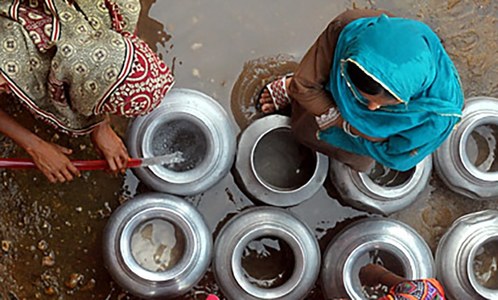ISLAMABAD: Funding from the Islamic Development Bank (IDB) for development projects in Pakistan under the country partnership strategy has almost come to a halt because the bank currently has no such programme for the country in place.
The previous partnership strategy covering a four-year period ended in 2015, and the Jeddah-based Islamic bank has not yet finalised a fresh strategy, according to official sources.
After completion of the 2012-15 partnership strategy, the government had requested the IDB to undertake the repeater strategy in line with the country’s five-year development plan and ‘Vision 2025’.
The bank has felt that based on lessons learned from its limited interventions in provinces, there will be a need to undertake a detailed study for sectors, such as agriculture, health and education, which have been shifted from the federal government to provincial governments under the devolution process.
A review of the 2012-15 partnership revealed that the Islamic bank did not approve any project in the agricultural sector. The reason attributed for non-inclusion of any agricultural related project in the strategy is the devolution process.
Since the devolution has been completed, the IDB has now ample scope to include projects of the provinces, particularly in the irrigation sector, sources close to the Economic Affairs Division indicate.
The IDB had pledged $500 million, which was 20 per cent of overall financing envelop, for supporting the agricultural and rural development sectors. However, new development projects faced a serious setback as one of the approved projects, directly contributing to the partnership strategy, construction of grain silos with a financing of $90m was cancelled due to issues related to the devolution process.
The report points out that devolution has hampered new projects, specifically the project for promotion of resource conservation technologies for enhancing water use efficiency.
Despite the fact that the country strategy interventions addressed both national level agricultural issues and provincial priorities, the barriers of dealing with the provincial ministries without federal government guarantee under the new institutional structures have prohibited speedy development of projects, the report says.
Additionally, the lack of clarity on the mandate and institutional responsibilities of various units dealing with agriculture and rural development issues made provincial engagement difficult. Further, the security situation in the country, especially in Khyber Pakhtunkhwa and Balochistan, has halted the IDB interventions in these provinces.
Another area in which the Islamic bank did not approve any project, is the transport sector, and the report pointed out the sluggish implementation pace of some of the ongoing projects which caused the lack of interest of the bank in this sector.
During the first three years of implementation, the progress report showed that the overall implementation of the partnership strategy has been quite satisfactory. Projects approved amounted to $1.89 billion or 75.6pc approvals by the IDB out of $2.5bn indicative financing. The IDB approvals were mainly in infrastructure, human development and private sector development.
The review report pointed out that despite satisfactory achievement, some of the projects faced several challenges, such as lack of timely provision of counterpart funding and inadequate coordination between various government entities, slow disbursement, changes in the institutional and governance structures under the devolution, delay in signature and declaration of effectiveness of the financing agreements, lengthy internal approval process of the government and deteriorating political and security situation.
During the first three years of the country partnership strategy, net approvals for energy sector amounted to $360m and the main focus areas were renewable energy and clean coal energy. The IDB approved 100MW Fauji wind project with an amount of $140m, of which 82pc has already been disbursed. A second energy project, 600MW Jamshoro coal power plant of $220m, was approved in partnership with the ADB (Asian Development Bank), which is providing $750m.
According to the report, for energy sector projects, lack of timely provision of counterpart funding and inadequate coordination between various entities have slowed the overall project implementation in the sector.
Published in Dawn, April 3rd, 2017















































Dear visitor, the comments section is undergoing an overhaul and will return soon.